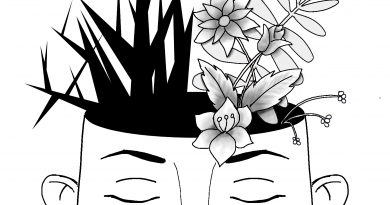That Passed Away; This Also May
By: Hanya Captan
@HanyaCaptan
This March marks two years since the start of the pandemic. There have been social media posts commemorating this grim milestone.
Why would someone want to commemorate something like that?
It feels like two years in, things still aren’t quite back to normal yet. There are still variants popping up around the world, surges in cases, and glacially slow vaccination rates.
As more time drags on, the return to normal feels like a fallacy.
This sense of hopelessness becomes amplified when one opens social media feeds and is bombarded with countless news stories announcing the woes of the day.
“COVID long hauler lives in constant fear as restrictions begin to lift”, “anti-vaxxer dying from COVID shares emotional warning”, “students reporting rise in mental health crises.”
At the early onset of the pandemic, some have decided to stop checking the news. It was back when we just started going into lockdown and were still unsure of what would come next from this novel virus. What some may find surprising is that there was never a shortage of news stories (all COVID-related, of course).
As the editor of The Caravan, I get the incentive to share every scrap of information one finds. I will also add that it was thanks to journalists that the world got the first wind of the COVID-19 pandemic.
But how did this information help those stuck at home during isolation; surely, they must have felt a sense of helplessness that there’s nothing they can do to change what’s going on around them.
We all did.
At that time, a particular song lyric resonated with me. It’s from a Simon & Garfunkel song and it goes, “I get the news I need on the weather report.”
I absolutely loved that line because it reminded me that all I really needed to know, or at least account for in my daily life was that which I was directly experiencing.
Now, this isn’t a call to be deliberately misinformed, but to set up a mental filter for what you internalize in your day to day lives.
If I had kept reading those news stories at the start of the pandemic, I would have given into a despair I’m not certain I would’ve been able to come back from.
And if I kept internalizing the news stories I read today, I would have never left the house or got on with my life.
Again, none of this is to say that we should all throw caution to the wind and dramatically rip off our masks, but to certainly find some grace for ourselves.
Looking around us now, we know that the pandemic still rages on, there are wars, and prices are skyrocketing.
But we also see friends waving at us when we see each other on the bus, the relief in our classmates’ eyes when we ace a group presentation, or the genuine joy that flows through campus when there’s a big celebration.
These rare moments of joy are constant and never happen in a world that is independent from atrocities and tragedies; oftentimes, they happen alongside them.
As I write this out, I am reminded of a poem I read in my freshman year. It’s called the “Deor’s Lament” and is told from the perspective of a poet who is exiled. To find comfort in his circumstances, he recalls and compares his situation with that of past heroic figures. He repeats to himself, “That passed away; this also may”.
I wasn’t so convinced of his reasoning at the time, but now, as I take my first (and last) history course I am reminded (and humbled) of the fact that there were plenty who came before who faced atrocities I couldn’t dream of.
And yet, here I am. All of us are the sum total of people who made the right call in a crisis. We should honor that, by continuing to do the same.




